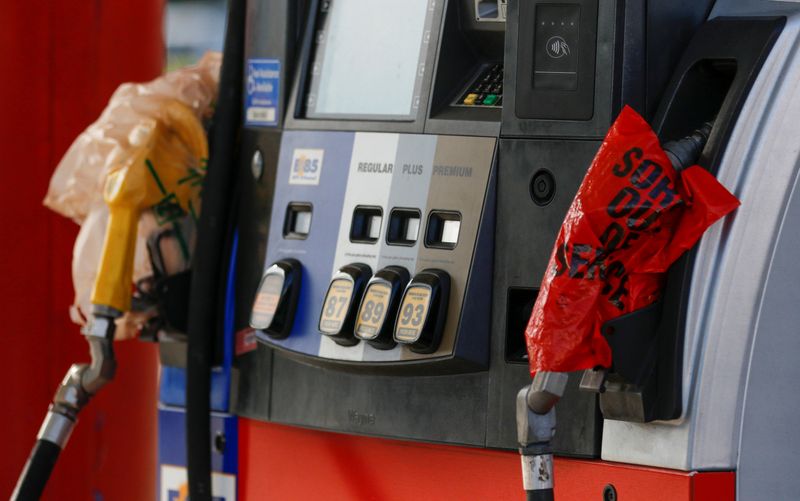By Devika Krishna Kumar and Laila Kearney
NEW YORK (Reuters) - The southeastern United States will be the first to see price rises at the pumps due to the supply disruption caused by the shutdown of the country's top fuel pipeline network - and demand has already picked up as drivers fill their tanks, industry experts said on Sunday.
The attack forced Colonial Pipeline to shut down its entire system on Friday. Some smaller lines were restarted Sunday, but Colonial has given no timeline for the restart of its main pipelines.
The network ships more than 2.5 million barrels per day (bpd) of gasoline, diesel and jet fuel from the Gulf Coast to populous southeast and northeast states.
Florida, Georgia, Alabama, South Carolina, North Carolina, and Tennessee rely on the line for most of their fuel supplies and suffered localized shortages and higher prices during previous shutdowns.
Demand in some states served by the pipeline - including Alabama, Florida, Georgia and Tennessee - rose about 4.3% on Saturday compared to a week earlier, said Patrick DeHaan, head of petroleum analysis at fuel tracking firm GasBuddy.
Demand is picking up across the United States as more people are vaccinated against COVID-19 and begin to travel more. The peak demand summer driving season begins at the end of May.
DeHaan said drivers should avoid panic buying.
"Rushing out and filling your tank will make the problem much much more acute and likely double or triple the length of any supply event, if it comes to that," he said.
Florida is the third biggest gasoline consuming state in the United States in 2019 and Georgia was the sixth, according to latest U.S. Energy Information Administration (EIA) data.
Gas prices have risen a cent on the gallon since Friday, said the American Automobile Association. The average price stood at $2.962 for regular unleaded gasoline compared with $2.901 a week earlier, the AAA said.
"If the interruption persists, we will see more regional impacts than nation-wide, in terms of supply and prices. The south/southeast (Maryland to Mississippi to Georgia), will likely see gas prices increase first," the AAA said in a statement to Reuters.
"The shorter the pipeline shutdown, the better news for motorists."
There will likely be price increases at fuel distribution points at several locations, said Ernie Barsamian, chief executive officer of The Tank Tiger, a U.S. terminal storage clearinghouse. Those distribution centers are particularly in Wilmington in North Carolina, Charleston in South Carolina and Savannah in Georgia, he said.
Most of the terminals along Colonial Pipeline's route should have at least 10 days of supply, but since prices to sell now are higher than those for later, companies have not been incentivized to store fuel and some terminals could be running leaner, Barsamian added.
JET FUEL
Airlines in the region would also be vulnerable to a prolonged outage, said Tom Kloza, founder of the Oil Price Information Service.
"Perhaps the biggest concern might be jet fuel," he said. "... airports tend to really test the boundaries of just-in-time inventory practices."
Airports served by Colonial include some of the busiest in the country - including Hartsfield-Jackson Atlanta International Airport, one of the busiest in the world by passenger traffic, and Charlotte Douglas International Airport.
The Colonial shutdown has not affected operations at Hartsfield-Jackson airport and its airlines are in close communications with fuel suppliers and are confident the incident will be reconciled before there is an operational impact, a spokesman for the airport told Reuters.
Fuel suppliers will need to seek to transport stopgap supplies through other pipelines, but none of them have the capacity to compensate for Colonial's shutdown. Suppliers may also use barges and trucks, but those are more expensive.
Suppliers started booking space on a smaller pipeline that serves some of those states as soon as the Colonial Pipeline shut down on Friday, market participants said.
The Plantation Pipeline is working with customers to take on more volume, said Melissa Ruiz, a spokeswoman for Kinder Morgan (NYSE:KMI), which operates the line.
The pipeline can only carry a fraction of the fuel that would have gone through the Colonial Pipeline. Plantation has capacity to carry 720,000 bpd and its mainlines are fully subscribed and frozen for the month of May, Ruiz said, adding that the company is deferring any non-essential maintenance to keep the line flowing.
Colonial supplies about 45% of all fuel consumed on the East Coast, providing refined products to more than 50 million Americans.

Dependency on the pipeline has grown in recent years as old refineries on the U.S. East coast have shut down.
The region around New York is less vulnerable to disruptions than the southeast as it can receive fuel imports from Europe and elsewhere.